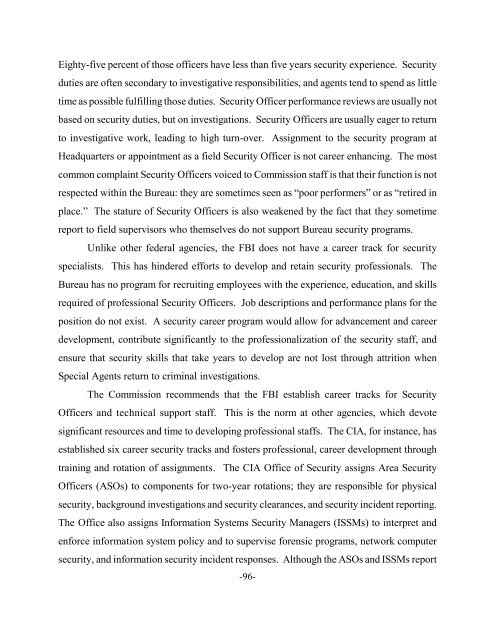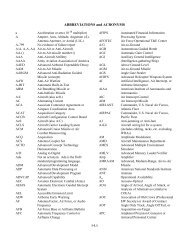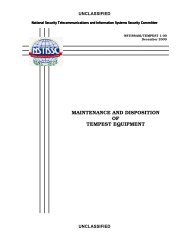A Review of FBI Security Programs
A Review of FBI Security Programs
A Review of FBI Security Programs
You also want an ePaper? Increase the reach of your titles
YUMPU automatically turns print PDFs into web optimized ePapers that Google loves.
Eighty-five percent <strong>of</strong> those <strong>of</strong>ficers have less than five years security experience. <strong>Security</strong><br />
duties are <strong>of</strong>ten secondary to investigative responsibilities, and agents tend to spend as little<br />
time as possible fulfilling those duties. <strong>Security</strong> Officer performance reviews are usually not<br />
based on security duties, but on investigations. <strong>Security</strong> Officers are usually eager to return<br />
to investigative work, leading to high turn-over. Assignment to the security program at<br />
Headquarters or appointment as a field <strong>Security</strong> Officer is not career enhancing. The most<br />
common complaint <strong>Security</strong> Officers voiced to Commission staff is that their function is not<br />
respected within the Bureau: they are sometimes seen as “poor performers” or as “retired in<br />
place.” The stature <strong>of</strong> <strong>Security</strong> Officers is also weakened by the fact that they sometime<br />
report to field supervisors who themselves do not support Bureau security programs.<br />
Unlike other federal agencies, the <strong>FBI</strong> does not have a career track for security<br />
specialists. This has hindered efforts to develop and retain security pr<strong>of</strong>essionals. The<br />
Bureau has no program for recruiting employees with the experience, education, and skills<br />
required <strong>of</strong> pr<strong>of</strong>essional <strong>Security</strong> Officers. Job descriptions and performance plans for the<br />
position do not exist. A security career program would allow for advancement and career<br />
development, contribute significantly to the pr<strong>of</strong>essionalization <strong>of</strong> the security staff, and<br />
ensure that security skills that take years to develop are not lost through attrition when<br />
Special Agents return to criminal investigations.<br />
The Commission recommends that the <strong>FBI</strong> establish career tracks for <strong>Security</strong><br />
Officers and technical support staff. This is the norm at other agencies, which devote<br />
significant resources and time to developing pr<strong>of</strong>essional staffs. The CIA, for instance, has<br />
established six career security tracks and fosters pr<strong>of</strong>essional, career development through<br />
training and rotation <strong>of</strong> assignments. The CIA Office <strong>of</strong> <strong>Security</strong> assigns Area <strong>Security</strong><br />
Officers (ASOs) to components for two-year rotations; they are responsible for physical<br />
security, background investigations and security clearances, and security incident reporting.<br />
The Office also assigns Information Systems <strong>Security</strong> Managers (ISSMs) to interpret and<br />
enforce information system policy and to supervise forensic programs, network computer<br />
security, and information security incident responses. Although the ASOs and ISSMs report<br />
-96-
















